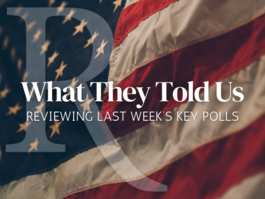Attacking the Truth by Thomas Sowell
Among the many sad signs of our time are the current political and media attacks on Supreme Court Justice Antonin Scalia, for speaking the plain truth on a subject where lies have been the norm for years.

Among the many sad signs of our time are the current political and media attacks on Supreme Court Justice Antonin Scalia, for speaking the plain truth on a subject where lies have been the norm for years.

On Sept. 14, 2012, three days after the murder of Ambassador Christopher Stevens, Sean Smith, Glen Doherty and Tyrone Woods in Benghazi, Libya, Hillary Clinton appeared at Andrews air force base, where she spoke with family members of those slain.

A lot of voters claim to be following the debates between the presidential candidates from both major parties but don’t feel they have learned much about those candidates so far.

Twenty-four percent (24%) of Likely U.S. Voters now think the country is heading in the right direction, according to a new Rasmussen Reports national telephone survey for the week ending December 10.

Americans continue to shop at a record pace this holiday season.

More voters than ever see a worsening relationship between the United States and the Islamic world, but they are less convinced that most Muslims around the world view America as an enemy and vice versa.

Donald Trump appears to have defied the media and the political status quo once again.

George Stephanopoulos, ABC News: "You're increasingly being compared to Hitler. Does that give you any pause at all?"
Donald Trump: "Because what I'm doing is no different than what FDR [did]. FDR's solution for Germans, Italians, Japanese many years ago. This is a president who was highly respected by all. He did the same thing -- if you look at what he was doing it was far worse."
When it comes down to core values, you can never make an exception.

Belief among Republicans that Donald Trump is their next likely presidential candidate continues to rise despite his condemnation by nearly all the other GOP candidates for proposing a temporary ban on immigrants from Muslim countries.

Calling for a moratorium on Muslim immigration "until our country's representatives can figure out what the hell is going on," Donald Trump this week ignited a firestorm of historic proportions.

President Obama claims that restricting immigration in order to protect national security is "offensive and contrary to American values." No-limits liberals have attacked common-sense proposals for heightened visa scrutiny, profiling or immigration slowdowns as "un-American."

As the week began, I planned to write this column about some implications of Barack Obama's Sunday night Oval Office address. I noted that he devoted about one-fifth of this 13-minute speech to pleas that Americans not discriminate against Muslims.
"It is the responsibility of all Americans -- of every faith -- to reject discrimination," he said. "It's our responsibility to reject proposals that Muslim Americans should somehow be treated differently."

Following the horrific attacks in Paris and California, belief that the terrorists are winning the War on Terror is near its highest level ever in regular surveying since 2004.

Americans are putting a lot more stock in religion this Christmas season.

The Donald Trump Show continues to dominate the airwaves and the polls, and the other candidates seem mere apprentices by comparison.
The billionaire’s appeal is very disproportionately tilted to the blue-collar half of the Republican electorate — many are the old Reagan Democrats who have long since defected from the party of their fathers. Much of the college-educated half of the party, by contrast, views Trump with disdain, but they are fractured and split among the rest of the contenders.

Despite an international uproar and condemnation by President Obama and nearly all of those running for the presidency, Donald Trump’s proposed ban on Muslims coming to the United States has the support of a sizable majority of Republicans – and a plurality of all voters.

Americans are embracing the holiday season this year and are in the giving spirit.


Calm down and think, America.